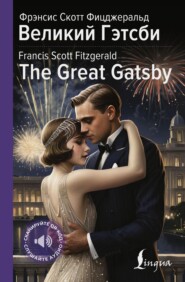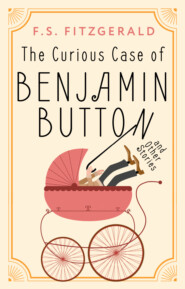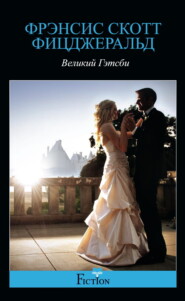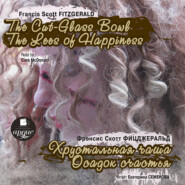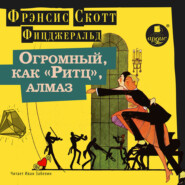По всем вопросам обращайтесь на: info@litportal.ru
(©) 2003-2024.
✖
«Великий Гэтсби» и другие лучшие произведения Ф.С. Фицджеральда
Год написания книги
2015
Теги
Настройки чтения
Размер шрифта
Высота строк
Поля
‘Why – not exactly.’
‘You said a bad driver was only safe until she met another bad driver? Well, I met another bad driver, didn’t I? I mean it was careless of me to make such a wrong guess. I thought you were rather an honest, straightforward person. I thought it was your secret pride.’
‘I’m thirty,’ I said. ‘I’m five years too old to lie to myself and call it honour.’
She didn’t answer. Angry, and half in love with her, and tremendously sorry, I turned away.
* * *
One afternoon late in October I saw Tom Buchanan. He was walking ahead of me along Fifth Avenue in his alert, aggressive way, his hands out a little from his body as if to fight off interference, his head moving sharply here and there, adapting itself to his restless eyes. Just as I slowed up to avoid overtaking him he stopped and began frowning into the windows of a jewellery store. Suddenly he saw me and walked back, holding out his hand.
‘What’s the matter, Nick? Do you object to shaking hands with me?’
‘Yes. You know what I think of you.’
‘You’re crazy, Nick,’ he said quickly. ‘Crazy as hell. I don’t know what’s the matter with you.’
‘Tom,’ I inquired, ‘what did you say to Wilson that afternoon?’
He stared at me without a word, and I knew I had guessed right about those missing hours. I started to turn away, but he took a step after me and grabbed my arm.
‘I told him the truth,’ he said. ‘He came to the door while we were getting ready to leave, and when I sent down word that we weren’t in he tried to force his way upstairs. He was crazy enough to kill me if I hadn’t told him who owned the car. His hand was on a revolver in his pocket every minute he was in the house – ’ He broke off defiantly. ‘What if I did tell him? That fellow had it coming to him. He threw dust into your eyes just like he did in Daisy’s, but he was a tough one. He ran over Myrtle like you’d run over a dog and never even stopped his car.’
There was nothing I could say, except the one unutterable fact that it wasn’t true.
‘And if you think I didn’t have my share of suffering – look here, when I went to give up that flat and saw that damn box of dog biscuits sitting there on the sideboard, I sat down and cried like a baby. By God it was awful – ’
I couldn’t forgive him or like him, but I saw that what he had done was, to him, entirely justified. It was all very careless and confused. They were careless people, Tom and Daisy – they smashed up things and creatures and then retreated back into their money or their vast carelessness, or whatever it was that kept them together, and let other people clean up the mess they had made…
I shook hands with him; it seemed silly not to, for I felt suddenly as though I were talking to a child. Then he went into the jewellery store to buy a pearl necklace – or perhaps only a pair of cuff buttons – rid of my provincial squeamishness forever.
* * *
Gatsby’s house was still empty when I left – the grass on his lawn had grown as long as mine. One of the taxi drivers in the village never took a fare past the entrance gate without stopping for a minute and pointing inside; perhaps it was he who drove Daisy and Gatsby over to East Egg the night of the accident, and perhaps he had made a story about it all his own. I didn’t want to hear it and I avoided him when I got off the train.
I spent my Saturday nights in New York because those gleaming, dazzling parties of his were with me so vividly that I could still hear the music and the laughter, faint and incessant, from his garden, and the cars going up and down his drive. One night I did hear a material car there, and saw its lights stop at his front steps. But I didn’t investigate. Probably it was some final guest who had been away at the ends of the earth and didn’t know that the party was over.
On the last night, with my trunk packed and my car sold to the grocer, I went over and looked at that huge incoherent failure of a house once more. On the white steps an obscene word, scrawled by some boy with a piece of brick, stood out clearly in the moonlight, and I erased it, drawing my shoe raspingly along the stone. Then I wandered down to the beach and sprawled out on the sand.
Most of the big shore places were closed now and there were hardly any lights except the shadowy, moving glow of a ferryboat across the Sound. And as the moon rose higher the inessential houses began to melt away until gradually I became aware of the old island here that flowered once for Dutch sailors’ eyes – a fresh, green breast of the new world. Its vanished trees, the trees that had made way for Gatsby’s house, had once pandered in whispers to the last and greatest of all human dreams; for a transitory enchanted moment man must have held his breath in the presence of this continent, compelled into an aesthetic contemplation he neither understood nor desired, face to face for the last time in history with something commensurate to his capacity for wonder.
And as I sat there brooding on the old, unknown world, I thought of Gatsby’s wonder when he first picked out the green light at the end of Daisy’s dock. He had come a long way to this blue lawn, and his dream must have seemed so close that he could hardly fail to grasp it. He did not know that it was already behind him, somewhere back in that vast obscurity beyond the city, where the dark fields of the republic rolled on under the night.
Gatsby believed in the green light, the orgiastic future that year by year recedes before us. It eluded us then, but that’s no matter – tomorrow we will run faster, stretch out our arms farther… And one fine morning —
So we beat on, boats against the current, borne back ceaselessly into the past.
Tender Is the Night
Already with thee! tender is the night…
… But here there is no light,
Save what from heaven is with the breezes blown
Through verdurous glooms and winding mossy ways.
– Ode to a Nightingale
TO
GERALD and SARA
MANY FÊTES[103 - fêtes = holiday, festival (French); fun.]
Book 1
I
On the pleasant shore of the French Riviera[104 - the French Riviera – the Mediterranean coast between Cannes in France and the border with Italy], about half way between Marseilles and the Italian border, stands a large, proud, rose-colored hotel. Deferential palms cool its flushed façade, and before it stretches a short dazzling beach. Lately it has become a summer resort of notable and fashionable people; a decade ago it was almost deserted after its English clientele went north in April. Now, many bungalows cluster near it, but when this story begins only the cupolas of a dozen old villas rotted like water lilies among the massed pines between Gausse’s Hôtel des Étrangers[105 - Hôtel des Étrangers = Hotel for Foreigners (French)] and Cannes, five miles away.
The hotel and its bright tan prayer rug of a beach were one. In the early morning the distant image of Cannes, the pink and cream of old fortifications, the purple Alp that bounded Italy, were cast across the water and lay quavering in the ripples and rings sent up by sea-plants through the clear shallows. Before eight a man came down to the beach in a blue bathrobe and with much preliminary application to his person of the chilly water, and much grunting and loud breathing, floundered a minute in the sea. When he had gone, beach and bay were quiet for an hour. Merchantmen crawled westward on the horizon; bus boys shouted in the hotel court; the dew dried upon the pines. In another hour the horns of motors began to blow down from the winding road along the low range of the Maures[106 - the Maures – mountains in southeastern France, the part of the Maritime Alps that separate the Riviera from Provence], which separates the littoral from true Provençal France[107 - Provençal France – Provence, a historical and cultural region in southeastern France].
A mile from the sea, where pines give way to dusty poplars, is an isolated railroad stop, whence one June morning in 1925 a victoria brought a woman and her daughter down to Gausse’s Hotel. The mother’s face was of a fading prettiness that would soon be patted with broken veins; her expression was both tranquil and aware in a pleasant way. However, one’s eye moved on quickly to her daughter, who had magic in her pink palms and her cheeks lit to a lovely flame, like the thrilling flush of children after their cold baths in the evening. Her fine forehead sloped gently up to where her hair, bordering it – like an armorial shield, burst into lovelocks and waves and curlicues of ash blonde and gold. Her eyes were bright, big, clear, wet, and shining, the color of her cheeks was real, breaking close to the surface from the strong young pump of her heart. Her body hovered delicately on the last edge of childhood – she was almost eighteen, nearly complete, but the dew was still on her.
As sea and sky appeared below them in a thin, hot line the mother said:
“Something tells me we’re not going to like this place.”
“I want to go home anyhow,” the girl answered.
They both spoke cheerfully but were obviously without direction and bored by the fact – moreover, just any direction would not do. They wanted high excitement, not from the necessity of stimulating jaded nerves but with the avidity of prize-winning schoolchildren who deserved their vacations.
“We’ll stay three days and then go home. I’ll wire right away for steamer tickets.”
At the hotel the girl made the reservation in idiomatic but rather flat French, like something remembered. When they were installed on the ground floor she walked into the glare of the French windows[108 - French windows – large windows serving as windows and doors opening to the balcony or a garden] and out a few steps onto the stone veranda that ran the length of the hotel. When she walked she carried herself like a ballet-dancer, not slumped down on her hips but held up in the small of her back. Out there the hot light clipped close her shadow and she retreated – it was too bright to see. Fifty yards away the Mediterranean yielded up its pigments, moment by moment, to the brutal sunshine; below the balustrade a faded Buick[109 - Buick – a car of the Buick line, named for David Buick (1854–1929), the first American automobile manufacturer and the founder of the Buick Manufacturing Company] cooked on the hotel drive.
Indeed, of all the region only the beach stirred with activity. Three British nannies sat knitting the slow pattern of Victorian England[110 - Victorian England – England in 1837–1901 at the times of Queen Victoria (1819–1901)], the pattern of the forties, the sixties, and the eighties, into sweaters and socks, to the tune of gossip as formalized as incantation; closer to the sea a dozen persons kept house under striped umbrellas, while their dozen children pursued unintimidated fish through the shallows or lay naked and glistening with cocoanut oil out in the sun.
As Rosemary came onto the beach a boy of twelve ran past her and dashed into the sea with exultant cries. Feeling the impactive scrutiny of strange faces, she took off her bathrobe and followed. She floated face down for a few yards and finding it shallow staggered to her feet and plodded forward, dragging slim legs like weights against the resistance of the water. When it was about breast high, she glanced back toward shore: a bald man in a monocle[111 - monocle – a single eyeglass held by the muscles around the eye] and a pair of tights[112 - a pair of tights – a man’s bathing-suit of the first decades of the 20
century], his tufted chest thrown out, his brash navel sucked in, was regarding her attentively. As Rosemary returned the gaze the man dislodged the monocle, which went into hiding amid the facetious whiskers of his chest, and poured himself a glass of something from a bottle in his hand.
Rosemary laid her face on the water and swam a choppy little four-beat crawl out to the raft. The water reached up for her, pulled her down tenderly out of the heat, seeped in her hair and ran into the corners of her body. She turned round and round in it, embracing it, wallowing in it. Reaching the raft she was out of breath, but a tanned woman with very white teeth looked down at her, and Rosemary, suddenly conscious of the raw whiteness of her own body, turned on her back and drifted toward shore. The hairy man holding the bottle spoke to her as she came out.
“I say – they have sharks out behind the raft.” He was of indeterminate nationality, but spoke English with a slow Oxford drawl. “Yesterday they devoured two British sailors from the flotte[113 - flotte = fleet (French)] at Golfe Juan[114 - Golfe Juan – a town on the French Riviera 7 km from Cannes].”
“Heavens!” exclaimed Rosemary.
“They come in for the refuse from the flotte.”
‘You said a bad driver was only safe until she met another bad driver? Well, I met another bad driver, didn’t I? I mean it was careless of me to make such a wrong guess. I thought you were rather an honest, straightforward person. I thought it was your secret pride.’
‘I’m thirty,’ I said. ‘I’m five years too old to lie to myself and call it honour.’
She didn’t answer. Angry, and half in love with her, and tremendously sorry, I turned away.
* * *
One afternoon late in October I saw Tom Buchanan. He was walking ahead of me along Fifth Avenue in his alert, aggressive way, his hands out a little from his body as if to fight off interference, his head moving sharply here and there, adapting itself to his restless eyes. Just as I slowed up to avoid overtaking him he stopped and began frowning into the windows of a jewellery store. Suddenly he saw me and walked back, holding out his hand.
‘What’s the matter, Nick? Do you object to shaking hands with me?’
‘Yes. You know what I think of you.’
‘You’re crazy, Nick,’ he said quickly. ‘Crazy as hell. I don’t know what’s the matter with you.’
‘Tom,’ I inquired, ‘what did you say to Wilson that afternoon?’
He stared at me without a word, and I knew I had guessed right about those missing hours. I started to turn away, but he took a step after me and grabbed my arm.
‘I told him the truth,’ he said. ‘He came to the door while we were getting ready to leave, and when I sent down word that we weren’t in he tried to force his way upstairs. He was crazy enough to kill me if I hadn’t told him who owned the car. His hand was on a revolver in his pocket every minute he was in the house – ’ He broke off defiantly. ‘What if I did tell him? That fellow had it coming to him. He threw dust into your eyes just like he did in Daisy’s, but he was a tough one. He ran over Myrtle like you’d run over a dog and never even stopped his car.’
There was nothing I could say, except the one unutterable fact that it wasn’t true.
‘And if you think I didn’t have my share of suffering – look here, when I went to give up that flat and saw that damn box of dog biscuits sitting there on the sideboard, I sat down and cried like a baby. By God it was awful – ’
I couldn’t forgive him or like him, but I saw that what he had done was, to him, entirely justified. It was all very careless and confused. They were careless people, Tom and Daisy – they smashed up things and creatures and then retreated back into their money or their vast carelessness, or whatever it was that kept them together, and let other people clean up the mess they had made…
I shook hands with him; it seemed silly not to, for I felt suddenly as though I were talking to a child. Then he went into the jewellery store to buy a pearl necklace – or perhaps only a pair of cuff buttons – rid of my provincial squeamishness forever.
* * *
Gatsby’s house was still empty when I left – the grass on his lawn had grown as long as mine. One of the taxi drivers in the village never took a fare past the entrance gate without stopping for a minute and pointing inside; perhaps it was he who drove Daisy and Gatsby over to East Egg the night of the accident, and perhaps he had made a story about it all his own. I didn’t want to hear it and I avoided him when I got off the train.
I spent my Saturday nights in New York because those gleaming, dazzling parties of his were with me so vividly that I could still hear the music and the laughter, faint and incessant, from his garden, and the cars going up and down his drive. One night I did hear a material car there, and saw its lights stop at his front steps. But I didn’t investigate. Probably it was some final guest who had been away at the ends of the earth and didn’t know that the party was over.
On the last night, with my trunk packed and my car sold to the grocer, I went over and looked at that huge incoherent failure of a house once more. On the white steps an obscene word, scrawled by some boy with a piece of brick, stood out clearly in the moonlight, and I erased it, drawing my shoe raspingly along the stone. Then I wandered down to the beach and sprawled out on the sand.
Most of the big shore places were closed now and there were hardly any lights except the shadowy, moving glow of a ferryboat across the Sound. And as the moon rose higher the inessential houses began to melt away until gradually I became aware of the old island here that flowered once for Dutch sailors’ eyes – a fresh, green breast of the new world. Its vanished trees, the trees that had made way for Gatsby’s house, had once pandered in whispers to the last and greatest of all human dreams; for a transitory enchanted moment man must have held his breath in the presence of this continent, compelled into an aesthetic contemplation he neither understood nor desired, face to face for the last time in history with something commensurate to his capacity for wonder.
And as I sat there brooding on the old, unknown world, I thought of Gatsby’s wonder when he first picked out the green light at the end of Daisy’s dock. He had come a long way to this blue lawn, and his dream must have seemed so close that he could hardly fail to grasp it. He did not know that it was already behind him, somewhere back in that vast obscurity beyond the city, where the dark fields of the republic rolled on under the night.
Gatsby believed in the green light, the orgiastic future that year by year recedes before us. It eluded us then, but that’s no matter – tomorrow we will run faster, stretch out our arms farther… And one fine morning —
So we beat on, boats against the current, borne back ceaselessly into the past.
Tender Is the Night
Already with thee! tender is the night…
… But here there is no light,
Save what from heaven is with the breezes blown
Through verdurous glooms and winding mossy ways.
– Ode to a Nightingale
TO
GERALD and SARA
MANY FÊTES[103 - fêtes = holiday, festival (French); fun.]
Book 1
I
On the pleasant shore of the French Riviera[104 - the French Riviera – the Mediterranean coast between Cannes in France and the border with Italy], about half way between Marseilles and the Italian border, stands a large, proud, rose-colored hotel. Deferential palms cool its flushed façade, and before it stretches a short dazzling beach. Lately it has become a summer resort of notable and fashionable people; a decade ago it was almost deserted after its English clientele went north in April. Now, many bungalows cluster near it, but when this story begins only the cupolas of a dozen old villas rotted like water lilies among the massed pines between Gausse’s Hôtel des Étrangers[105 - Hôtel des Étrangers = Hotel for Foreigners (French)] and Cannes, five miles away.
The hotel and its bright tan prayer rug of a beach were one. In the early morning the distant image of Cannes, the pink and cream of old fortifications, the purple Alp that bounded Italy, were cast across the water and lay quavering in the ripples and rings sent up by sea-plants through the clear shallows. Before eight a man came down to the beach in a blue bathrobe and with much preliminary application to his person of the chilly water, and much grunting and loud breathing, floundered a minute in the sea. When he had gone, beach and bay were quiet for an hour. Merchantmen crawled westward on the horizon; bus boys shouted in the hotel court; the dew dried upon the pines. In another hour the horns of motors began to blow down from the winding road along the low range of the Maures[106 - the Maures – mountains in southeastern France, the part of the Maritime Alps that separate the Riviera from Provence], which separates the littoral from true Provençal France[107 - Provençal France – Provence, a historical and cultural region in southeastern France].
A mile from the sea, where pines give way to dusty poplars, is an isolated railroad stop, whence one June morning in 1925 a victoria brought a woman and her daughter down to Gausse’s Hotel. The mother’s face was of a fading prettiness that would soon be patted with broken veins; her expression was both tranquil and aware in a pleasant way. However, one’s eye moved on quickly to her daughter, who had magic in her pink palms and her cheeks lit to a lovely flame, like the thrilling flush of children after their cold baths in the evening. Her fine forehead sloped gently up to where her hair, bordering it – like an armorial shield, burst into lovelocks and waves and curlicues of ash blonde and gold. Her eyes were bright, big, clear, wet, and shining, the color of her cheeks was real, breaking close to the surface from the strong young pump of her heart. Her body hovered delicately on the last edge of childhood – she was almost eighteen, nearly complete, but the dew was still on her.
As sea and sky appeared below them in a thin, hot line the mother said:
“Something tells me we’re not going to like this place.”
“I want to go home anyhow,” the girl answered.
They both spoke cheerfully but were obviously without direction and bored by the fact – moreover, just any direction would not do. They wanted high excitement, not from the necessity of stimulating jaded nerves but with the avidity of prize-winning schoolchildren who deserved their vacations.
“We’ll stay three days and then go home. I’ll wire right away for steamer tickets.”
At the hotel the girl made the reservation in idiomatic but rather flat French, like something remembered. When they were installed on the ground floor she walked into the glare of the French windows[108 - French windows – large windows serving as windows and doors opening to the balcony or a garden] and out a few steps onto the stone veranda that ran the length of the hotel. When she walked she carried herself like a ballet-dancer, not slumped down on her hips but held up in the small of her back. Out there the hot light clipped close her shadow and she retreated – it was too bright to see. Fifty yards away the Mediterranean yielded up its pigments, moment by moment, to the brutal sunshine; below the balustrade a faded Buick[109 - Buick – a car of the Buick line, named for David Buick (1854–1929), the first American automobile manufacturer and the founder of the Buick Manufacturing Company] cooked on the hotel drive.
Indeed, of all the region only the beach stirred with activity. Three British nannies sat knitting the slow pattern of Victorian England[110 - Victorian England – England in 1837–1901 at the times of Queen Victoria (1819–1901)], the pattern of the forties, the sixties, and the eighties, into sweaters and socks, to the tune of gossip as formalized as incantation; closer to the sea a dozen persons kept house under striped umbrellas, while their dozen children pursued unintimidated fish through the shallows or lay naked and glistening with cocoanut oil out in the sun.
As Rosemary came onto the beach a boy of twelve ran past her and dashed into the sea with exultant cries. Feeling the impactive scrutiny of strange faces, she took off her bathrobe and followed. She floated face down for a few yards and finding it shallow staggered to her feet and plodded forward, dragging slim legs like weights against the resistance of the water. When it was about breast high, she glanced back toward shore: a bald man in a monocle[111 - monocle – a single eyeglass held by the muscles around the eye] and a pair of tights[112 - a pair of tights – a man’s bathing-suit of the first decades of the 20
century], his tufted chest thrown out, his brash navel sucked in, was regarding her attentively. As Rosemary returned the gaze the man dislodged the monocle, which went into hiding amid the facetious whiskers of his chest, and poured himself a glass of something from a bottle in his hand.
Rosemary laid her face on the water and swam a choppy little four-beat crawl out to the raft. The water reached up for her, pulled her down tenderly out of the heat, seeped in her hair and ran into the corners of her body. She turned round and round in it, embracing it, wallowing in it. Reaching the raft she was out of breath, but a tanned woman with very white teeth looked down at her, and Rosemary, suddenly conscious of the raw whiteness of her own body, turned on her back and drifted toward shore. The hairy man holding the bottle spoke to her as she came out.
“I say – they have sharks out behind the raft.” He was of indeterminate nationality, but spoke English with a slow Oxford drawl. “Yesterday they devoured two British sailors from the flotte[113 - flotte = fleet (French)] at Golfe Juan[114 - Golfe Juan – a town on the French Riviera 7 km from Cannes].”
“Heavens!” exclaimed Rosemary.
“They come in for the refuse from the flotte.”






